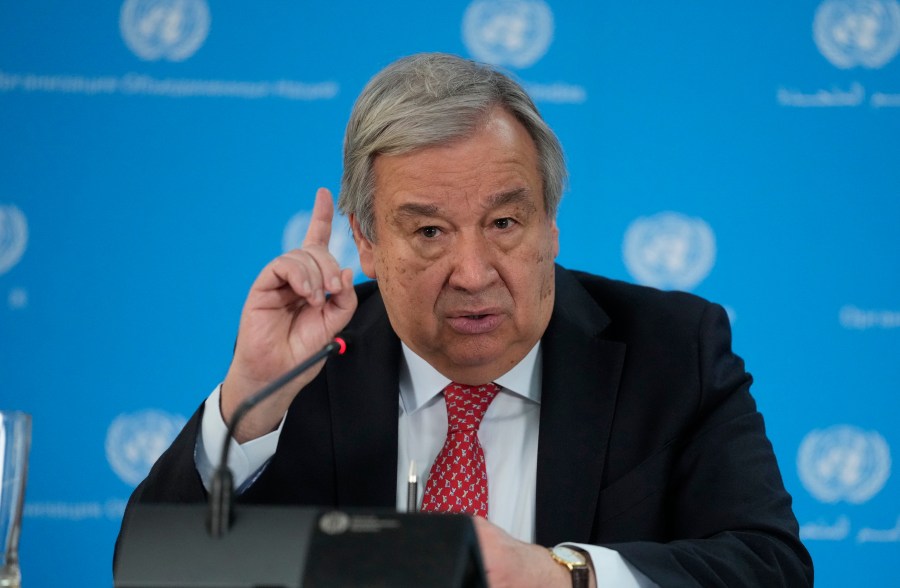Ceasefire resolution in Gaza took five attempts to pass, why?
- The U.S. vetoed three ceasefire resolutions
- It is unclear if the resolution will extend past two weeks
- Gaza facing famine
(NewsNation) — The United Nations Security Council passed a cease-fire resolution Monday after four previous failed attempts at quelling massive violence in the Gaza strip.
The road to the ceasefire resolution has taken nearly six months and several iterations, which were largely blocked by the United States over their stance that the resolutions didn’t go far enough to condemn Hamas.
The current resolution, which was introduced by Mozambique, called for an immediate cease-fire for the remaining two weeks of Ramadan, the immediate and unconditional release of hostages and “the urgent need to expand the flow” of aid into Gaza, the U.N. said.
The resolution passed with 14 members of the U.N. security council voting in favor, while the U.S. abstained.
The abstention came as a marked change from the hardline vetoes the U.S. had been maintaining before introducing its own resolution, which failed on Friday.
“This resolution must be implemented. Failure would be unforgivable,” U.N. Secretary-General António Guterres said Monday.
At least 32,333 people have been killed and over 74,000 have been injured since violence erupted after Hamas’ attack on Israel, according to the Gaza Health Ministry, reported Al Jazeera News.
The Strip is also rapidly approaching famine as aid trucks have been blocked from entering Rafah, reported Reuters.
Why did a ceasefire resolution take five tries to pass?
Monday’s resolution came as the fifth attempt by the Security Council to approve a ceasefire.
The U.S., which is one of five permanent members on the council, vetoed three of the prior resolutions, citing that they were not directly tied to the release of Israeli hostages and that language should have condemned Hamas more forcefully.
Under U.N. voting rules, permanent members have a right to veto, and if they do so the resolution cannot pass.
Apart from the U.S., Russia, China, France, and the United Kingdom are also permanent members on the 15 member council.
The first ceasefire resolution was introduced on October 18 by Brazil and called for “humanitarian pauses” to deliver lifesaving aid to millions in Gaza.
While 12 members voted in favor of the draft, the U.S. voted against it. Russia and the United Kingdom abstained.
U.S. Ambassador Linda Thomas-Greenfield said she vetoed the draft as it “did not mention Israel’s right of self-defense.”
The United Arab Emirates put forth the next attempt at a ceasefire in December, which was backed by 13 members of the council but vetoed once again by the U.S., who explained the draft again did not go far enough to condemn Hamas.
The second attempt came about following an urgent letter by Secretary-General Guterres urging the body to help end carnage in the war-battered enclave through a lasting humanitarian cease-fire. The move is rarely used and signaled the U.N.’s growing concern over humanitarian violations and violence in Gaza.

In his letter, Guterres said, “The eyes of the world — and the eyes of history — are watching.”
The third attempt came in February by Algeria who put forth a resolution on behalf of the Arab states calling for an immediate ceasefire. That attempt was again vetoed again by the U.S. who said that they are working on their own draft that would condemn Hamas but also support a temporary cease-fire.
Thomas-Greenfield said her delegation is working on a hostage deal.
“Sometimes hard diplomacy takes more time than any of us might like,” she said. “Any action this Council takes should help and not hinder these sensitive ongoing negotiations.”
The U.S. put forth their own resolution draft Friday, but that was vetoed by Russia and China who called it ambiguous and said it was not the direct demand to end the fighting.
What does this mean going forward?
While the ceasefire was a significant development to stop the bloodshed in Gaza, it is unclear if it will extend past Ramadan or if there may be more permanent solutions to the violence.
After the U.S. chose not to veto the latest resolution, Israel’s prime Minister Benjamin Netanyahu canceled a high-level Israeli delegation’s planned visit to Washington seemingly in anger.
While the resolution called for the unconditional release of hostages, it did not make a cease-fire contingent upon the release of the remaining Israeli hostages.
Several humanitarian groups welcomed the resolution as an important step to stop the violence, but maintained it needs to go beyond the remaining two weeks of Ramadan.
“A ceasefire is the only way to ensure civilians are protected and is central to enabling the scale up of humanitarian assistance to safely reach those in desperate need,” International Rescue Committee, which is providing aid in Gaza, said in a statement. “This resolution must serve as a critical turning point and it must be implemented.”









